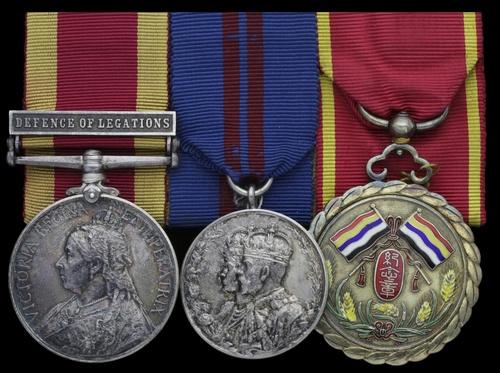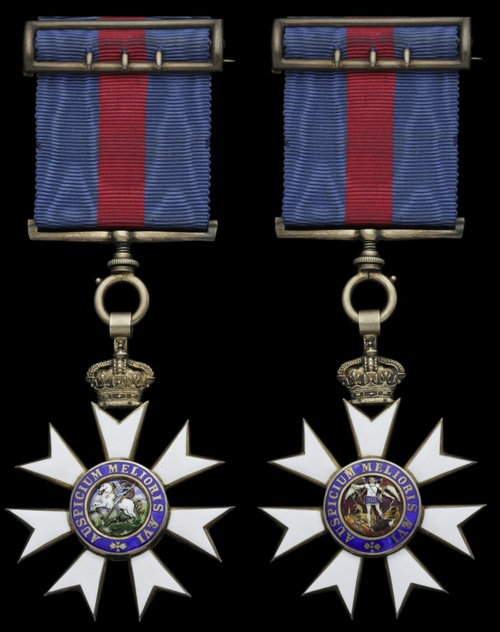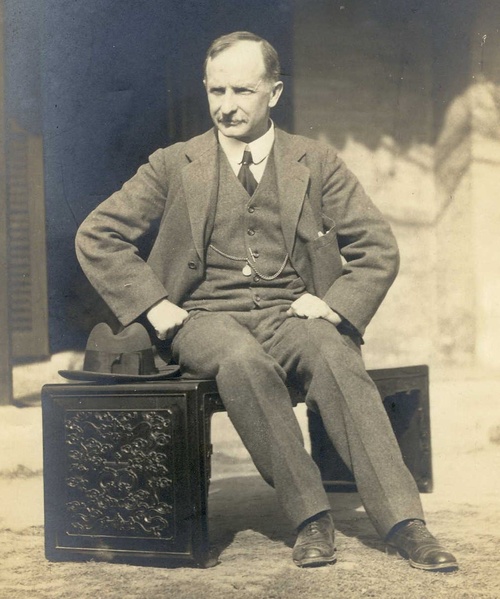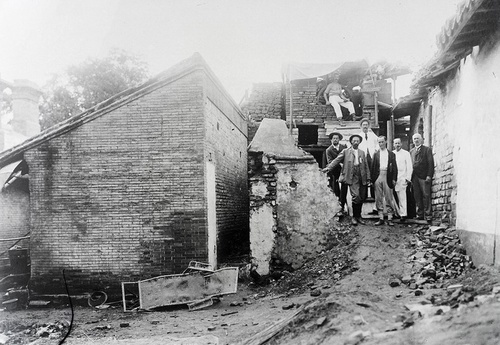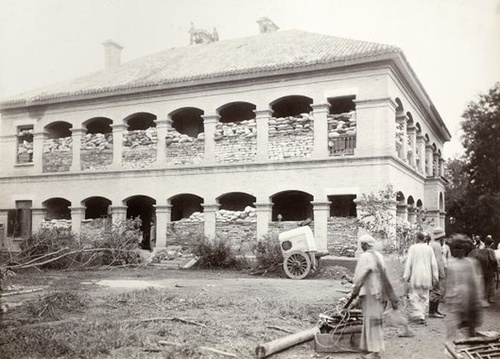Auction: 20002 - Orders, Decorations, Medals & Space Exploration
Lot: 546
(x) 'Bullets whizz over our heads all day and riddle the tops of houses; today the Fortifications Committee has begun constructing bomb-proof shelters in case they start shelling us from the Ch'ien Men.'
Ker writes on 25 June 1900, plenty more would come his way in the following weeks.
A rare Boxer rebellion ‘Defence of Legations’ group of four awarded to Mr W. P. 'Bill' Ker, C.M.G., Vice-Consul and Second Chinese Secretary at the British Legation during the siege of Peking, later a long-served Consul-General at Tientsin
The Most Distinguished Order of St. Michael and St. George, C.M.G., Companion’s breast Badge, silver-gilt and enamel, in its R. & S. Garrard & Co. case of issue, both centres with chips to enamel; China 1900, 1 clasp, Defence of Legations (W. P. Ker, Vice-Consul) officially engraved naming in the usual style for Officers; Coronation 1911; China, Republic, Presidential Inauguration Commemorative Medal of Yuan Shi-kai as the first President, 10 October 1913, silver-gilt and enamel, the reverse with finely enamelled crossed national flags, Chinese characters, ears of grain, etc., the last three mounted court-style as worn by Hunt & Roskell Ltd, good very fine (4)
William Pollock Ker - or Bill to his friends and comrades - was born on 12 December 1864, son of the Reverend W. T. Ker, of Deskford, Banffshire. He graduated as an M.A. from Aberdeen University and, having passed a competitive examination, was appointed a Student Interpreter in China on 26 July 1888. He was promoted to be a 2nd Class Assistant in April 1894, and a 1st Class Assistant in September 1897. He was Acting Consul at Soochow in 1897 and 1898, and Acting Vice-Consul at Shanghai in 1898 and 1899. Employed as an Assistant in the Chinese Secretary’s Office at Peking from 28 May 1899 to 15 September 1901 and was present throughout the siege of the Legations at Peking, 20 June-14 August 1900. His letter of 25 June continues:
'We have a General Committee to supervise all the internal arrangements, subdivided into Fortifications, Sanitation, Commissariat, Registration, and so on, but it has not yet got into very smooth working order. Chinese labour is supplied by refugees from the Nantang who are deposited in the Fu opposite but they are poorly fed and hardly worked. Bullets whizz over our heads all day and riddle the tops of houses; today the Fortifications Committee has begun constructing bomb-proof shelters in case they start shelling us from the Ch'ien Men.'
He was mentioned in Sir Claude MacDonald’s Siege of Peking despatch in the following terms:
‘Mr Cockburn, besides acting as a volunteer in the barricades of the West Wall, was in charge of the very important correspondence which took place between the enemy and myself, commencing on the 16th July. By means of this correspondence much valuable time was gained, which enabled our defences to be considerably strengthened, so that, when the final assaults were delivered, they were repulsed with heavy loss to the attackers. Mr Cockburn’s house was especially selected by the enemy for their attentions; several shells struck and burst on the roof, and rifle bullets pierced the mosquito curtains, besides other parts of the house.
Mr Ker was a very able second to to Mr Cockburn; he came particularly under my notice as a conscientious worker.’
That work in Cockburn's House - or Fort Cockburn during the siege - would surely have seen Ker called to action on the British Nordenfeldt gun mounted in that region, when Sergeant J. Murphy, Royal Marines, was unable to man it. Six days after the lifting of the siege, another victim was claimed in the form of Ker’s baby son, Murray, aged one year and ten months. With this sad event behind him, Ker continued as Acting Consul at Wuhu from October 1901 to April 1902, when he was promoted to be Consul at Wuhu. He was called to the Bar at the Middle Temple in June 1903 and accordingly returned to London. He transferred to Nanking in March 1905, and was Acting Consul-General at Tientsin in 1908 and 1909. In January of that year he was appointed Commercial Attaché in China, a post he held through to March 1917. He received the Coronation Medal, 1911, and was made a C.M.G. on 3 June 1913. In the following month Ker was appointed Commissioner to examine and adjudicate upon British claims arising out of the revolution in China in 1912, by which a new republic came into being.
In April 1917 he gave up his post of Commercial Attaché upon appointment as Consul-General at Tientsin. He was granted a new Commission as one of H.M. Consuls-General in China on 1 March 1922, and retired from the service, whilst Consul-General at Tientsin, at the end of 1926. Publishing Chinese under British rule in Malaya, Hongkong and Weihaiwei in 1929, he retired to The Malt House, East Horsley, Surrey and died suddenly on 6 August 1945 at Manor House, Iffley, Oxford; sold together with original warrant of appointment as Consul-General in China, signed by King George V, and dated 1 March 1922.
In 2017, J. C. Ker, a grandaughter of William, published Lest we Forget, which featured a plethora of family images and anecdotes regarding their life and times. The description stated:
In 1897, Lucy Christina Murray left Canada, the land to which her Scottish ancestors had emigrated nearly a century earlier, to sail overseas with her new husband. Her husband, William Pollock Ker, was a British consular official in China and, in 1900, they were posted to Peking and found themselves besieged in the Legation Quarters during the Boxer Rebellion. They emerged to read their obituaries in The Times of London and to face many more challenging years in China. They witnessed, firsthand, the end of the Qing dynasty and the emergence of the Republic of China. Despite personal tragedies, they grew to love and admire the emerging country.
As the wife of a consular official who spent over thirty years in Asia, Lucy’s life was always challenging. On the domestic front, she had to be ready to pack up a household at very short notice and to adjust to arbitrary and frequent new postings. On the public front, she found each posting required new skills. One posting required her to act as hostess for Sir Ernest Satow in Peking. In Tientsin, she found herself organising the relief of the incoming White Russians. During her lifetime, she crossed paths with many historically interesting figures, both Chinese and European, including the last Emperor of China.'
Interested parties would also enjoy Peter Fleming's The Siege of Peking.
Subject to 5% tax on Hammer Price in addition to 20% VAT on Buyer’s Premium.
Sold for
£11,000
Starting price
£6000

